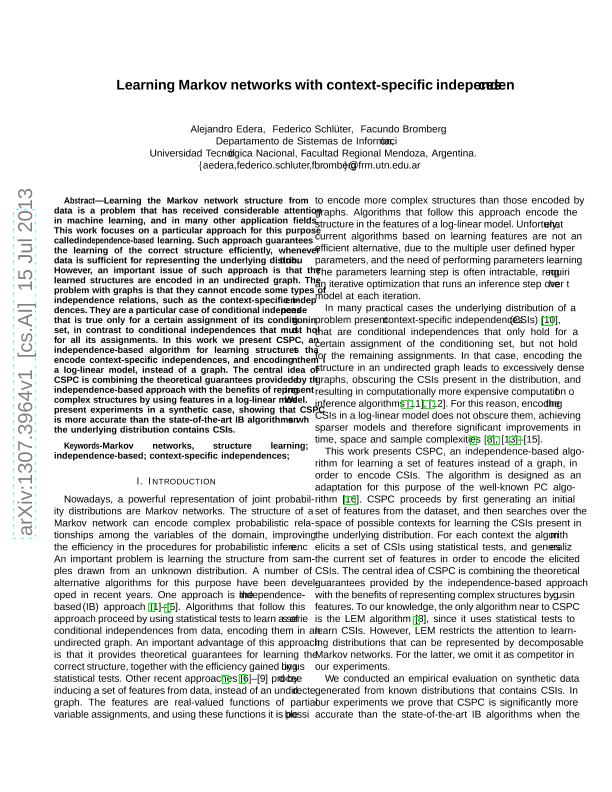Artículo
Learning Markov Network Structures Constrained by Context-Specific Independences
Fecha de publicación:
12/2014
Editorial:
World Scientific
Revista:
International Journal On Artificial Intelligence Tools
ISSN:
0218-2130
e-ISSN:
1793-6349
Idioma:
Inglés
Tipo de recurso:
Artículo publicado
Clasificación temática:
Resumen
This work focuses on learning the structure of Markov networks from data. Markov networks are parametric models for compactly representing complex probability distributions. These models are composed by: a structure and numerical weights, where the structure describes independences that hold in the distribution. Depending on which is the goal of structure learning, learning algorithms can be divided into: density estimation algorithms, where structure is learned for answering inference queries; and knowledge discovery algorithms, where structure is learned for describing independences qualitatively. The latter algorithms present an important limitation for describing independences because they use a single graph; a coarse grain structure representation which cannot represent flexible independences. For instance, context-specific independences cannot be described by a single graph. To overcome this limitation, this work proposes a new alternative representation named canonical model as well as the CSPC algorithm; a novel knowledge discovery algorithm for learning canonical models by using context-specific independences as constraints. On an extensive empirical evaluation, CSPC learns more accurate structures than state-of-the-art density estimation and knowledge discovery algorithms. Moreover, for answering inference queries, our approach obtains competitive results against density estimation algorithms, significantly outperforming knowledge discovery algorithms.
Archivos asociados
Licencia
Identificadores
Colecciones
Articulos(CCT - MENDOZA)
Articulos de CTRO.CIENTIFICO TECNOL.CONICET - MENDOZA
Articulos de CTRO.CIENTIFICO TECNOL.CONICET - MENDOZA
Citación
Bromberg, Facundo; Schluter, Federico Enrique Adolfo; Edera, Alejandro; Learning Markov Network Structures Constrained by Context-Specific Independences; World Scientific; International Journal On Artificial Intelligence Tools; 23; 6; 12-2014; 1-43
Compartir
Altmétricas




